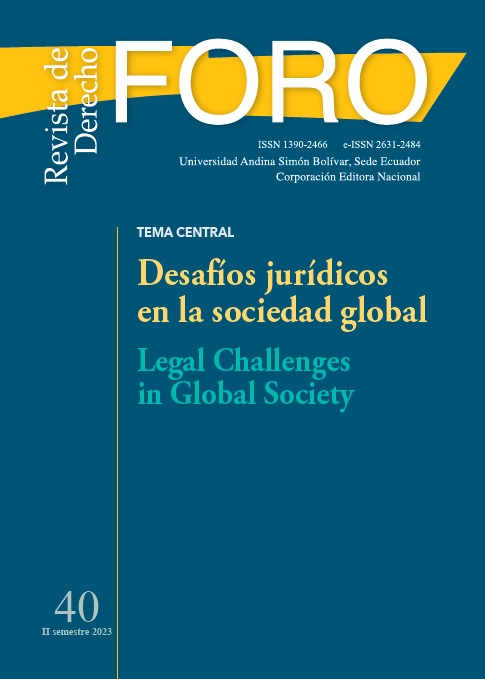La regresión del Estado de derecho en la Unión Europea: el caso húngaro
DOI:
https://doi.org/10.32719/26312484.2023.40.8Palabras clave:
democracia iliberal, Estado de derecho, Hungría, Obán, FIDESZ, Unión Europea, sanciones, integración regionalResumen
Hungría ha experimentado un retroceso en su Estado de derecho desde que el partido de Viktor Orbán obtuvo una supermayoría y con ello modificó las normas constitucionales que regían al país. Orbán, caracterizado por un populismo de derecha, ha sido ampliamente cuestionado no solo por la manera en la que ha acaparado el poder, sino por la manera en la que ha favorecido desde el estado a sus amigos y familiares cercanos. El FIDESZ, partido político de Orbán, defiende una visión constitucional que se ha calificado como constitucionalismo iliberal, donde prima una visión opuesta al integracionismo y más bien realza la idea de una identidad nacional opuesta a los valores de la Unión Europea como excusa para incumplir las normas internacionales. Las respuestas de la Unión Europea han sido varias y de distinta índole, tanto política, judicial como económica, pero al verse entrampados por el derecho de vetar las sanciones y el requisito de unanimidad para poder sancionar a un país que no cumple con los valores de la Unión Europea, parecería que no hay salida al deterioro del Estado de derecho. Así, el artículo analiza distintas salidas, opciones y posibilidades frente a la crisis del Estado de derecho y la democracia en Hungría.
Descargas
Referencias
Ádám, Zoltán. “Explaining Orbán: A Political Transaction Cost Theory of Authoritarian Populism”. Problems of Post-Communism 66, n.º 6 (2019): 385-401. https://doi.org/10.1080/10758216.2019.1643249. DOI: https://doi.org/10.1080/10758216.2019.1643249
AFP. “Hungary’s Orban Threatens EU Budget Veto”. France 24, May 4, 2018. bit.ly/3XfTMxB.
Bogdandy, Armin von, and Michael Ioannidis. “Systemic Deficiency in the Rule of Law: What It Is, What Has Been Done, What Can Be Done”. Common Market Law Review 51, n.º 1 (2014): 59-96. doi:10.54648/COLA2014003. DOI: https://doi.org/10.54648/COLA2014003
Brzozowski, Alexandra. “Orbán’s Fidesz Leaves EPP Group before Being Kicked Out”. www.euractiv.com, March 3, 2021. bit.ly/3kp1w1B.
Buckley, Neil, and Andrew Byrne. “Subscribe to Read | Financial Times”. www.ft.com, December 21, 2017. http://bit.ly/3w8lSPd.
Clinch, Matt. “Nationalist Viktor Orban Declares Victory in Hungary Election”. CNBC, April 3, 2022. bit.ly/3GQljP5.
Court of Justice of the European Union. Press Release n.º 28/22. February 16, 2022.
Drinóczi, Tímea, and Agnieszka Bie?-Kaca?a. “Illiberal Constitutionalism: The Case of Hungary and Poland”. German Law Journal 20, n.º 8 (2019): 1140-66. https://doi.org/10.1017/glj.2019.83. DOI: https://doi.org/10.1017/glj.2019.83
Dunai, Marton. “Hungary’s Viktor Orbán Loses Friends in Poland over Stance on Russia Sanctions”. Financial Times, June 9, 2022. http://bit.ly/3CWpffQ.
Euronews. “Polish Army Put on Alert after Two Killed in Blast near Ukraine Border”. Euronews, November 15, 2022. bit.ly/3QIbFTf.
European Parliament decision on discharge in respect of the implementation of the general budget of the European Union for the financial year 2018, Section III - Commission and executive agencies (2019/2055(DEC)) (May 13, 2020).
Galston, William. “Backsliding in Budapest: How Hungary Explains Europe’s Retreat from Democracy”. The New Republic 249, n.º 6 (2018): 10-.
Hos, Nikolett, and Tamas Gyulavari. “Retirement of Hungarian Judges, Age Discrimination and Judicial Independence: A Tale of Two Courts”. Industrial Law Journal (London) 42, n.º 3 (2013): 289-97. https://doi.org/10.1093/indlaw/dwt010. DOI: https://doi.org/10.1093/indlaw/dwt010
Kosa?, David, Ji?í Baroš, and Pavel Dufek. “The Twin Challenges to Separation of Powers in Central Europe: Technocratic Governance and Populism”. European
Constitutional Law Review 15, n.º 3 (2019): 427-61. https://doi.org/10.1017/S1574019619000336. DOI: https://doi.org/10.1017/S1574019619000336
Krzysztoszek, Aleksandra. “Morawiecki: Poland to Revive Relations with Hungary”. www.euractiv.com, September 5, 2022. http://bit.l/3wa5xcT.
Kubas, Sebastian, and Anna Czy?. “From a Liberal Opposition Party to a Right-Wing Party of Power. Three Decades of the Hungarian Fidesz (1988-2018)”. (2018). DOI: https://doi.org/10.17951/bc.2018.3.47-65
Lyman, Rick, and Alison Smale. “Defying Soviets, Then Pulling Hungary to Putin”. The New York Times, November 7, 2014. bit.ly/3H8XPGi.
Opinion of Advocate General Campos Sánchez-Bardona. Hungary v European Parliament, Council of the European Union C-156/21. para. 263.
Pappas, Takis S. “Populists in Power”. Journal of Democracy 30, n.º 2 (2019): 70-84. https://doi.org/10.1353/jod.2019.0026. DOI: https://doi.org/10.1353/jod.2019.0026
Pascale, Federica. “Italy’s Meloni Backs Orbán, Says Hungary Is ‘Democratic’ ”. www.euractiv.com. September 16, 2022. http://bit.ly/3Xj6FXE.
Regulation (EU, Euratom) 2020/2092 of the European Parliament and of the Council of 16 December 2020 on a general regime of conditionality for the protection of the Union budget.
Resolution of 12 September 2018 on a proposal calling on the Council to determine, pursuant to Article 7(1) of the Treaty on European Union.
Reuters. “Europe ‘Shot Itself in the Lungs’ with Sanctions on Russia, Orban Says”. Reuters, July 15, 2022, sec. Europe. bit.ly/3HaN9qt.
Sheppele, Kim Lane. “European Union’s Top Court Rules Against Hungary and Poland in Rule of Law Showdown”. World Justice Project, February 16, 2022, it.ly/3kcOh3S.
Tamma, Paola. “Poland and Hungary: How a Love Affair Turned Toxic”. POLITICO, November 29, 2022. bit.ly/3IUFj5x.
Than, Krisztina, and Krisztina Fenyo. “Thousands Protest against ‘Runaway Inflation’ in Hungary as It Tops 20pc”. Independent, October 23, 2022. https://bit.ly/3HccZuk.
Than, Krisztina, and Gergely Szakacs. “Fidesz Wins Hungary Election with Strong Mandate”. Reuters, April 12, 2010, sec. Editor’s Picks. eut.rs/3IVLpD0.
Uitz, Renata. “The Rule of Law in the EU: Crisis, Differentiation, Conditionality”. European Papers 2022 7, n.º 2 (2022): 929-48. https://doi.org/10.15166/2499-8249/587. DOI: https://doi.org/10.2139/ssrn.4081601
Zalan, Eszter. “[Analysis] Meloni’s Likely Win Will Not Necessarily Strengthen Orbán”. EUobserver, September 22, 2022. http://bit.ly/3QPG6aa.
Descargas
Publicado
Cómo citar
Número
Sección
Licencia

Esta obra está bajo una licencia internacional Creative Commons Atribución-NoComercial-CompartirIgual 4.0.
CESIÓN DE DERECHOS, DECLARACIÓN DE CONFLICTO DE INTERESES Y DIFUSIÓN
Los autores/as que publiquen en esta revista aceptan las siguientes condiciones:
- Los autores ceden a la Foro: Revista de Derecho, el derecho de la primera publicación. Las obras se publican en la edición electrónica e impresa de la revista bajo una Licencia Creative Commons 4.0 de Reconocimiento No Comercial-Compartir Igual 4.0, que habilita a compartir, adaptar y atribuir el trabajo (ver: Políticas de acceso abierto).
- Ver información completa de cesión de derechos, declaración de conflicto de intereses y difusión, aquí








